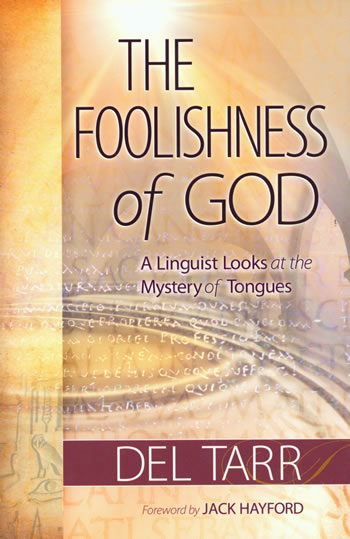Del Tarr: The Foolishness of God
 Del Tarr, The Foolishness of God: A Linguist Looks at the Mystery of Tongues (Springfield, MO: The Access Group, 2010), xvii +447 pages, ISBN 9780984447008.
Del Tarr, The Foolishness of God: A Linguist Looks at the Mystery of Tongues (Springfield, MO: The Access Group, 2010), xvii +447 pages, ISBN 9780984447008.
Del Tarr, Professor Emeritus and past President of the Assemblies of God Theological Seminary, who holds a PhD in Communications from the University of Minnesota, applies scientific linguistic and theological insights in a breakthrough analysis of the phenomenon of glossolalia.
Tarr writes amidst a mixed tradition of academic responses to tongues speaking. On the one hand, there are several earlier attempts to interpret the meaning of glossolalia in the New Testament and today from a Pentecostal perspective, such as Carl Brumback, ‘What Meaneth This?’ (1947), Wade Horton (ed.), The Glossolalia Phenomenon (1966), Ralph Harris, Spoken by the Spirit: Documented Accounts of ‘Other Tongues’ from Arabic to Zulu (cases of “xenolalia”—unlearned foreign languages, 1972), G. Williams and E. Waldvogel, “A History of Speaking in Tongues and Related Gifts” in The Charismatic Movement (1975), Russell Spittler, “Glossolalia,” in Dictionary of Pentecostal and Charismatic Movements (1992), and several more recent studies by Frank Macchia, for example, “Sighs Too Deep for Words: Toward a Theology of Glossolalia,” Journal of Pentecostal Theology 1 (1992), 47-73 up to Baptized in the Spirit: A Global Pentecostal Theology (Zondervan, 2006).
Non-Pentecostal evangelicals have been less positive about glossolalia, since their more substantial critiques are shaped by traditional Protestant cessationism precipitated by the growth of Pentecostalism and the early charismatic movement. These include Grant Wacker, “Travail of a Broken Family: Radical Evangelical Responses to the Emergence of Pentecostalism in America, 1906-16,” in Pentecostal Currents in American Protestantism (1999), A. Hoekema, Tongues and Spirit Baptism: A Biblical and Theological Evaluation (1966), R. Gromacki, The Modern Tongues Movement (1967), and F. D. Bruner’s expansive and insightful A Theology of the Holy Spirit: The Pentecostal Experience and the New Testament Witness (1970). Others include psychological, linguistic and sociological assessments of the phenomenon, such as J. Kildahl, The Psychology of Speaking in Tongues (1972), Wm. Samarin, Tongues of Men and Angels: The Religious Language of Pentecostalism (1972), and E. G. Hinson, “The Significance of Glossolalia in the History of Christianity” in Speaking in Tongues, Let’s Talk about It. Edited by Watson E. Mills (1973). A useful literature survey appears in Kay and Francis, “Personality, Mental Health and Glossolalia,” Pneuma 17:2 (Fall 1995).
In the era of the early charismatic renewal (1960s), Morton Kelsey’s classic, Tongues Speaking: An Experiment in Spiritual Experience (1964) was written from outside the Evangelical and Pentecostal debate in which the value on Christian doctrine competed with claims to religious experience (including tongues). To Kelsey, religious experience was also a valued—even beneficial—component in human existence, following similar studies by William James, Carl Jung, and Abraham Maslow, for whom Enlightenment rationalism seemed reductionistic. In this vein, Bruner’s traditional Reformed critique of Pentecostal “experience” met a substantial response in James Dunn’s Jesus and the Spirit: A Study of the Religious and Charismatic Experience of Jesus and the First Christians as Reflected in the New Testament (1975). The somewhat cool reception Dunn’s excellent work received from his academic audience reflected a complaint by Hendrikus Berkhof about the “water tight” partition between charismatic experience and academic theology: “Although Pentecostalism is a great deal more than a ‘tongues movement,’ it is the first movement to focus attention on this gift as being of crucial importance for understanding the nature of the divine-human encounter” (p.30).
Category: Spirit, Spring 2014


